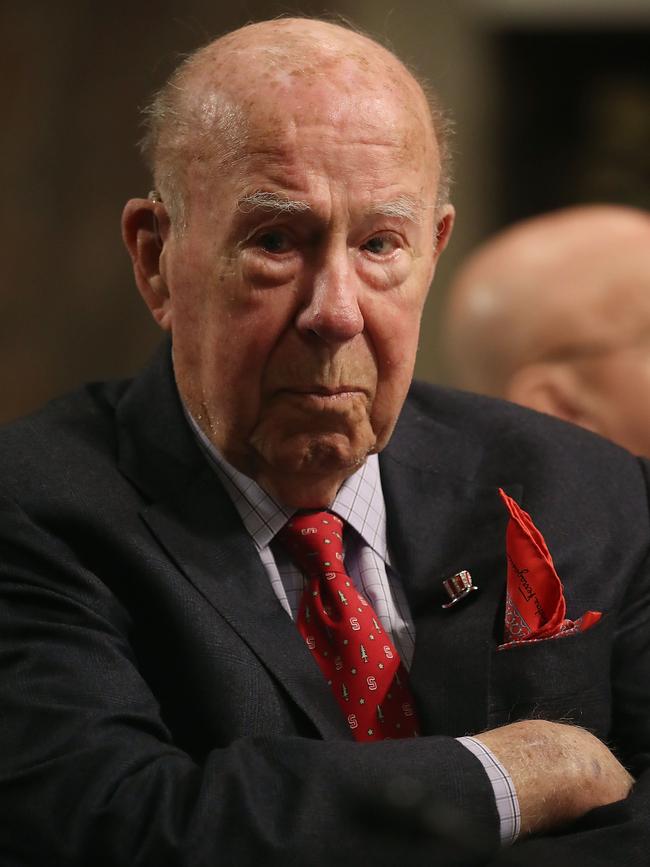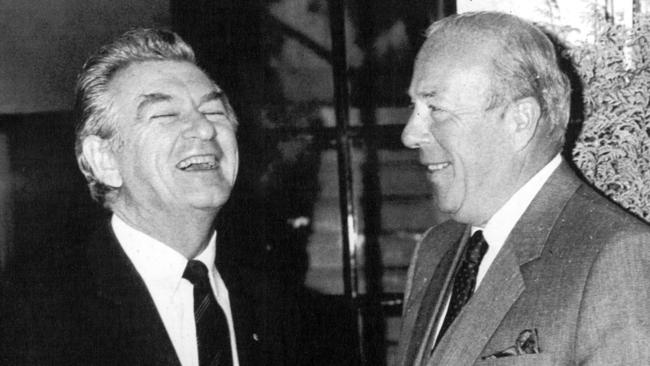George Shultz reveals the secret of a good US government
He has seen six presidents come and go — and helped Bob Hawke win over Ronald Reagan. Now, says the former US secretary of state, is a chance for his nation to reset.

As the US electoral college prepares to formally elect Joe Biden as 46th president this week, and Donald Trump continues to erroneously claim the election was “stolen” and refuses to accept defeat, Shultz sees a new administration as a chance to reset global foreign policy.
Shultz believes the standing of the US has declined over the past four years. He argues that US foreign policy has lacked clarity and coherence, and often strategic purpose, which has led to distrust among allies and adversaries. It will take years to rebuild.
In a long life that spans the Marines, academia, business and serving in cabinet under Richard Nixon and Ronald Reagan, Shultz says there is one lesson that he learned early and relearned over the past century: the importance of trust.
“When trust was in the room, whatever room that was — the family room, the school room, the coach’s room, the office room, the government room or the military room — good things happened,” he writes in a new essay marking the milestone birthday made available to The Australian. “When trust was not in the room, good things did not happen.”

It is a moral that Shultz illustrated in an interview conducted via Zoom, arguing that it is in building relationships, one-to-one, that offers the best hope for working through difficult and complex issues. “When you have people talking about problems, and developing trust, you begin to get somewhere,” he says.
It is the key to understanding how he worked effectively with Nixon to desegregate southern schools and resolve protracted labour disputes in the 1970s. And it was the vital ingredient in his work with Reagan to reduce global nuclear weapons, forge better relations with the Soviet Union and China, and eventually win the Cold War in the 80s.
It was absorbed in Shultz’s earliest years. “I still remember and know that my parents loved each other and loved me — every day of my life,” he writes. He realised that the best employers have faith in their employees, that students learn if they respect their teachers and that as a marine in the South Pacific during World War II he understood the importance of relying on others.
Nixon appointed Shultz as secretary of Labor (1969-70), then director of the Office of Management and Budget (1970-72) and secretary of the Treasury (1972-74). While recognising Nixon’s significant domestic and foreign policy achievements, Shultz does not think he can escape the shadow of Watergate.
For that reason, he does not think history will be kind to Nixon in the long term. “Nixon liked to think strategically,” Shultz recalls, paying tribute to Nixon’s leadership skills. “When he was under a lot of pressure (on labour matters) he could see a strategy and implemented it, and it worked.”
In 1970, schools in seven southern states were still segregated. Talks with local representatives to desegregate them were not successful. It was only when Attorney-General John Mitchell told them he would “enforce the law” that the debate shifted from “whether” to “how” to do it. Nixon further told them they had to accept their responsibilities as community leaders. This fostered rapport and respect, which was critical in seeing the schools desegregated
Reagan had called on Shultz for advice on economic policy while seeking the Republican nomination for president in 1980. When Alexander Haig resigned as secretary of state in 1982, Reagan offered the job to Shultz and he served until 1989.
Relations between the State Department and the White House had soured, so Reagan and Shultz met weekly to establish a more effective relationship.

“Reagan was a pleasure to work with,” Shultz says. “He was a lot of fun. He and I worked well together.” Shultz provided an insight into how Reagan dealt with foreign leaders: “He asked about the Chinese leaders — what are they like? He asked about Soviet leaders. Whenever he met a foreign leader he always asked himself, ‘What kind of person is this?’ He wanted to understand the people he was dealing with.”
Shultz says Reagan used storytelling because it appealed to minds as well as emotions. “Reagan understood that you could make a point or you could tell a story,” he writes. “Always tell a story to make your point whenever you can. It penetrates in a way no abstract point can — and it therefore forges an emotional bond, and emotional bonds build trust.” Bob Hawke became friends with Shultz when he visited Australia in the 70s. Shultz was then a senior executive with construction company Bechtel and Hawke was ACTU president.
“He was a pleasure to deal with,” Shultz recalled about Hawke. “He was tough and strong in representing (workers) but he was fair and you could work with him and come to a solution. So, I admired him and I got to like him.”

When Hawke became prime minister in 1983, there was some apprehension within the Reagan administration about a new Labor government in Australia. Memories of the difficult relationship between Nixon and Gough Whitlam, the previous Labor prime minister, were fresh. But Shultz reassured Reagan about Hawke.
“Settle down, this guy is going to be great,” Shultz remembered saying. “We went ahead on that presumption and I knew our relations would be wonderful … we valued our strong relationship with Australia and Bob was key; he had intelligence as well as substance.”
Shultz remembered a visit Hawke made to Washington when they cancelled several meetings and played golf instead. When Hawke had to retreat on a promise to monitor the testing of the MX missile it did no harm to his standing in the White House. “He was my friend,” Shultz said. “He trusted me and I trusted him.” This centennial year, like every other, has been busy for Shultz. His new book, A Hinge of History (Hoover Institution Press), was published last month. It is the result of a two-year project at Stanford University to examine current and emerging global challenges such as technology, demographics, migration, climate change, health and nuclear proliferation, and recommend strategies for dealing with them.
A central finding is the need for better international co-operation and collaboration, and US leadership. Better personal relationships and improved governance are critical, and so is regaining a sense of “world community”.
Shultz laments that the US is not “the leader we used to be”. Nor are there the leaders in other countries who can “command the respect” and “work together” like there was in the 80s.
Again, it comes back to trust. “That’s the big lesson that I learned these first one hundred years,” Shultz writes in his birthday essay. “I can’t wait to see what the big lesson will be from my next one hundred. We are on a hinge of history, and the future will not be like the past. But I know that trust will be part of it. It’s the coin of the realm.”




As he prepares to turn 100 on Monday, former US Secretary of State George Shultz is in a reflective mood. He served in the cabinets of two Republican presidents, has been an informal counsellor to diplomats and policymakers for generations, and is one of the architects of the strategy to end the Cold War.